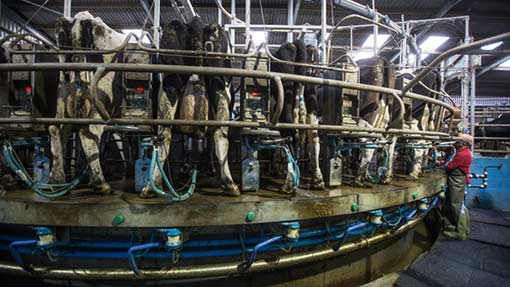Base milk price on company performance – NFUS

Farmgate milk prices should be based on the commercial performance of processors rather than knee-jerk responses to the market, according to NFU Scotland.
The union’s demand comes in the wake of this summer’s round of milk price cuts.
NFUS has now called on producers to get in touch to provide case studies and personal accounts of how their own specific price has been set. The information will be used to help the union assess what steps need to be taken to improve the current situation.
NFUS has also sent out a clear message to dairy farmers, telling them to take more a more proactive role in the marketing of their product.
See also: Arla drops milk price by 1.27ppl
Union milk committee chairman Gary Mitchell appealed to producers to become more active in either the co-op democratic structure or a plc producer group. He insisted that it was “vitally important” for all players in the dairy supply chain to understand how prices were set and how each individual farm business price was derived.
“Farmers must be able to trust the price and be able to react to any changes in pricing policy, and that requires a full and open understanding of the process,” he said.
Commenting specifically on the announcement that Arla amba has reduced its “on account” price to UK members by 0.94p per litre, Mr Mitchell said that this was disappointing, but a reflection of the downturn in global markets.
“NFUS has met several times with Arla senior management and elected farmer members to help us understand the governance, democracy and pricing policy. That included the company sitting down in private with our milk committee,” he said.
“More recently, Arla and NFUS have agreed that a more intensive ‘workshop’ type meeting will help us fully understand exactly how its system works. The voluntary code of practice on milk contracts has helped responsible processors and proactive farmers’ groups, plcs and co-ops to improve dialogue and representation, but there is still much to do if we are to be a genuinely collaborative and competitive supply chain.”
NFUS milk policy manager George Jamieson said the price a milk processor paid for his milk varied depending on its ability to maximise market potential through its business plan and plant efficiency.
“Crucially for farmer suppliers, the price paid should be as much as the business can pay and not merely as much as they have to,” he said. “Can we remind all processors that if they want long-term commitment from farmer suppliers then they should set a price based on performance and not use competitors’ adjustments as an easy excuse to drop?
“This demands a transparent and open pricing structure which farmers can trust and understand. This must be a two-way process with farmers and their representatives being fully aware of the wider markets, the performance of the processors they supply and how the farmgate milk price is arrived at.”
